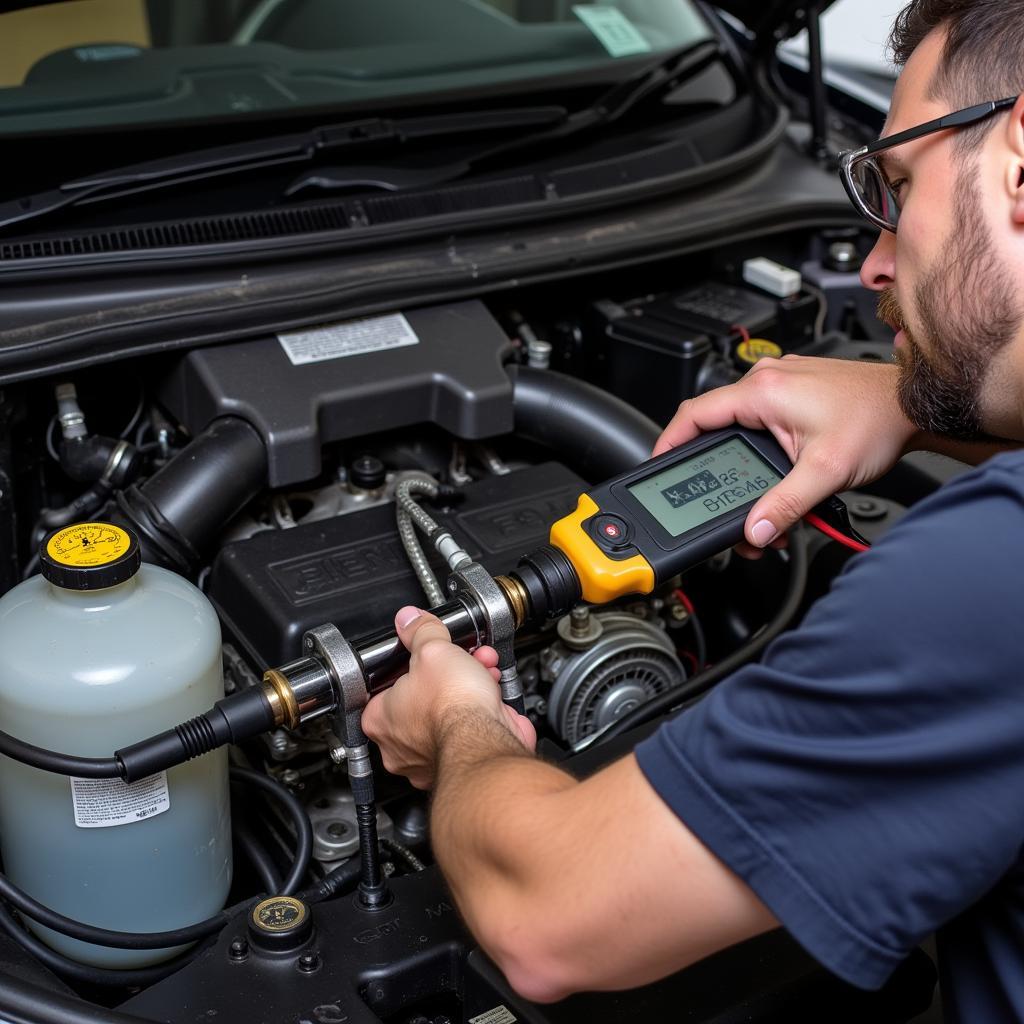Discovering your car AC isn’t blowing cold air can quickly ruin a pleasant drive. A common culprit is a refrigerant leak, which can be a frustrating and potentially costly problem. Understanding the factors influencing the cost to fix a car air conditioning leak can help you budget for the repair and ensure you’re getting a fair price.
Factors Affecting Car Air Conditioning Leak Repair Costs
Several factors can influence the overall cost of fixing your car’s AC refrigerant leak. These include:
1. Location of the Leak
Pinpointing the source of the leak is the first step in determining the repair cost. Leaks can occur in various components, including:
- Evaporator: Located inside the dashboard, accessing and repairing the evaporator is labor-intensive and often the most expensive leak to fix.
- Condenser: Positioned at the front of the vehicle, condenser leaks are generally more straightforward and less costly to repair.
- Hoses and Connections: Leaks in hoses and connections are common and relatively inexpensive to fix, often involving simple replacement.
- Compressor: While less frequent, compressor leaks can be costly due to the component’s price and the complexity of the repair.
2. Type of Refrigerant
Older vehicles may use R-12 refrigerant, which is no longer manufactured and can be expensive to replace due to its limited availability. Most modern cars use R-134a, a more environmentally friendly and affordable option. A newer refrigerant, R-1234yf, is becoming increasingly common but currently comes at a higher price point.
3. Labor Costs
Labor rates for AC repair can vary significantly based on location, the mechanic’s experience, and whether you choose a dealership, independent shop, or DIY approach.
4. Additional Repairs
During the leak repair, the mechanic may identify other worn or damaged components, such as O-rings, seals, or the receiver drier, which may require replacement and add to the overall cost.
Estimated Costs for Common AC Leak Repairs
While providing an exact cost estimate without inspecting your vehicle is impossible, here’s a general range for common AC leak repairs:
- Hose or Connection Leak: $100 – $300
- Condenser Leak: $200 – $600
- Evaporator Leak: $500 – $1500
- Compressor Leak: $800 – $2000
Important Note: These are rough estimates and can vary significantly. Always obtain multiple quotes from reputable mechanics before authorizing any repairs.
DIY vs. Professional Repair
While some minor AC leak repairs, like replacing a leaking hose, may be manageable for experienced DIYers, it’s generally recommended to seek professional help. AC systems are complex, and improper handling of refrigerant can be dangerous and harmful to the environment.
 Mechanic Inspecting Car AC System
Mechanic Inspecting Car AC System
Preventing Future AC Leaks
Regular maintenance can help prevent future leaks and keep your AC system running efficiently:
- Annual AC Service: Have your AC system inspected and serviced annually by a qualified technician.
- Visual Inspections: Regularly check your AC hoses and connections for signs of wear, cracks, or leaks.
- Keep it Running: Run your AC system for a few minutes each month, even during the off-season, to circulate the refrigerant and lubricate the seals.
“Catching small leaks early can save you significant money in the long run,” says John Smith, a certified automotive technician with over 20 years of experience. “Regular maintenance is key to a long-lasting and efficient car AC system.”
Conclusion
Dealing with a car air conditioning leak can be a frustrating experience, but understanding the factors influencing repair costs and taking preventative measures can save you time and money. By being proactive and seeking professional assistance when needed, you can keep your car cool and comfortable all year round.
If you’re experiencing car air conditioning issues or have questions about potential leaks, don’t hesitate to contact the experts at AutoTipPro. Our team of skilled technicians can diagnose and repair your AC system quickly and efficiently.
Contact us today at +1 (641) 206-8880 or visit our office at 500 N St Mary’s St, San Antonio, TX 78205, United States.
FAQs
1. How do I know if my car AC has a leak?
Signs of a leak include a gradual loss of cooling capacity, hissing sounds from the AC system, oily residue near AC components, and a sweet smell inside the car.
2. Can I recharge my car AC myself?
While DIY recharge kits are available, it’s generally not recommended unless you’re familiar with the process and safety precautions. Improper handling of refrigerant can be hazardous.
3. How long does it take to fix a car AC leak?
Repair time depends on the leak’s location and complexity. Simple repairs may take a few hours, while more involved repairs could require a day or more.
4. Does car insurance cover AC leak repairs?
Typically, car insurance policies don’t cover AC leak repairs unless the damage resulted from a covered incident, such as an accident.
5. How often should I service my car AC system?
It’s recommended to have your AC system inspected and serviced annually by a qualified technician, ideally before the start of the warmer months.
6. Can a car AC leak affect my health?
While refrigerant itself is not highly toxic in small amounts, leaks can reduce oxygen levels in the car, potentially causing headaches, dizziness, or, in extreme cases, loss of consciousness.
7. How can I prevent my car AC from developing leaks?
Regular maintenance, including annual inspections and servicing, is the best way to prevent AC leaks. Additionally, promptly addressing any unusual noises or performance issues can help catch small problems before they escalate.




Leave a Reply